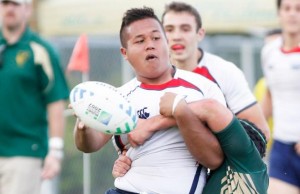
Bryan Dykes, an FAU alumnus, stares forward, watching his friends practice rugby on Henderson field. “It’s a brotherhood out here. It’s like 15 of us warriors out here.” He falters, lost for words for a moment. “To lose one, it hurts so bad.”
On Friday, March 8, at around 9 p.m., Adam Donohue, a junior physics major and member of FAU’s rugby team, was shot and fatally wounded while resisting arrest, according to the Palm Beach County Sheriff’s Office, after allegedly stealing a taxicab. His mother, Arlene Grimm, has heard from Donohue’s friends that he tried LSD that night, but the toxicology report has yet to be released. Mayme Mesa, a junior at Pope John Paul II High School, was there when it happened.
“[Donohue] jumped out of this taxi when he heard the cops coming and started hitting these cars’ windows, trying to get in,” Mesa said. “He must have knocked on two or three windows, trying to let him in.”
Mesa didn’t see the shots, she heard them; two echoing gunshots hitting Donohue in the chest, fired by Boca Raton Officer Brian Pare. Pare could not be reached for comment as of press time.
Donohue had never been in trouble with the police before — no criminal history or arrest record. Mesa says she has an image of a flailing young man burned into her mind, but the people who knew Donohue, his friends and family, knew him very differently.
Grimm had high hopes for him, and with good reason; Donohue was accepted to college with an athletic and academic scholarship, was captain of the wrestling team in high school, and Battalion Commander of the Junior Reserve Officer Training Corps. He got a football scholarship, despite never playing football in high school.
“As much as I thought that brilliant brain was going to come up with something,” Grimm said, “to create something, I have to wait and answer why he was taken so soon.”
According to a letter Grimm received from President Mary Jane Saunders, FAU established a two year Memorial Scholarship in Donohue’s honor. Media Relations did not responded as of press time to confirm this.
“He was a very quiet and reserved guy,” said Gregory Sun, one of Donohue’s teammates. “He never really said any more than what had to be said, but other than that, you could just tell that he was a generally nice guy. He was just the stereotypical gentle giant. He was like a big panda bear.”
Some people would expect this big guy, six-foot-two and 260 pounds, who played prop — the rugby equivalent of an offensive lineman — to be more hot-headed, more likely to throw his weight around. Not so. Gavin Curtis, one of the two FAU Rugby coaches can only think of one time he even saw Donohue get close to losing his temper.
“[Donohue] had one situation at practice here where he didn’t like what was happening,” Curtis said. “He didn’t get angry or hostile, he stepped back, he walked away, he got his composure, came back and practiced.”
Even in tense circumstances, Donohue would keep his head. He wouldn’t let words or actions touch him. Even on the rugby field, when things would go wrong or someone would foul him, it wouldn’t bother Donohue.
“You can kind of sense people, like the kids who are troublemakers,” Curtis said. “The ones on the field that I’ve got to council more, who get freaked out when they get tackled or somebody hits them, they want to go back and start a fight. Adam, I watched him play six rugby games. I watched him get hit late, I watched him get tackled hard, I watched him on the bottom of piles, and never once, ever, even threaten.”
Donohue was well liked by his teammates. According to Dykes, it was because people could trust him. “Adam was just one of those kids you could depend on. He was there for you on and off the field.”
Out of all the people on the rugby team, Donohue’s death seems to have hit Curtis the hardest, just because he did not know Donohue that well.
“Last night, I was just flashing through all the different scenes I’d seen [Donohue] in, and just that long trip to Tally a few weeks before,” he said. “He wasn’t on the practice field, he was just in the bus hanging out.”
The two had not really had a chance to connect until a few weeks before his death, on a bus trip to Tallahassee.
“What I really enjoyed was that I could see he recognized in me that I wasn’t just some stiff. It was kind of fun to get that reaction back from him,” Curtis said. “Before, when I was coaching him, I was talking to him, I was just the coach telling him what to do, and then in the van he saw me as a person. And I think that was the best moment of the whole trip.”


















